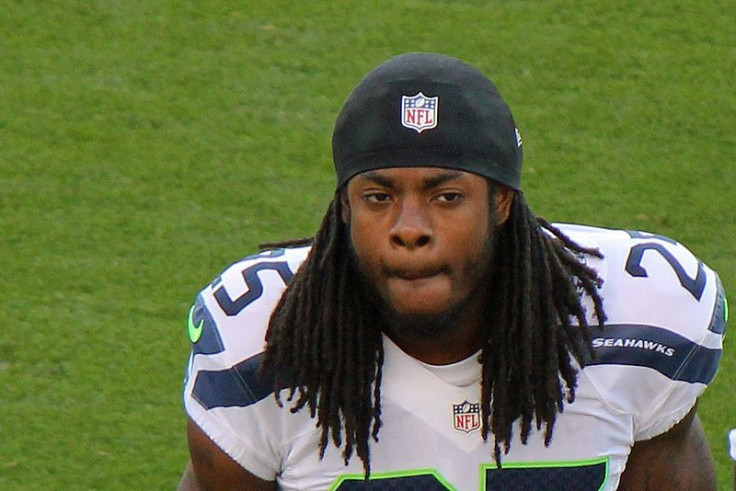Was Richard Sherman's Postgame Interview A PR Stunt? Here's Evidence That 'Beats By Dre' Commercial Was No Coincidence [VIDEO]
Analysis

Seattle Seahawks cornerback Richard Sherman’s new “Beats By Dre” commercial was released on the same day as his infamous postgame interview with Erin Andrews and contained several similarities to the real-life media backlash he faced this week. Is it possible that the entire thing was a viral marketing stunt?
During last Sunday’s NFC Championship game between Sherman’s Seattle Seahawks and division rival San Francisco 49ers, the 25-year-old cornerback’s pass deflection led to an interception that assured his team’s place in the Super Bowl. In the moments after the “Seattle Swat,” Sherman caught up with Andrews and gave a postgame interview that quickly became the talk of the sports world.
“Well, I’m the best corner in the game. When you try me with a sorry receiver like Crabtree, that’s the result you’re gonna get. Don’t you ever talk about me,” an emotional Sherman told Andrews. The Seahawks cornerback’s boastful comments caused a backlash among NFL pundits and fans alike, many of whom accused him of being a “thug” and questioned the example that the postgame interview might set for kids.
Coincidentally, or not, Sherman’s new “Beats By Dre” commercial — released on the same day the interview took place — raised many of the same questions that he has faced this week. During a Wednesday press conference, Sherman stated his belief that the term “thug” — a phrase used by his critics to describe him after the interview —was racist and just a socially acceptable way using the “n-word.”
“The reason it bothers me is because it seems like it’s an accepted way of calling somebody the N-word now,” Sherman said, via CBS Sports. “It’s like everybody else said the N-word and then they say 'thug' and that’s fine. It kind of take me aback and it’s kind of disappointing because they know.”
A reporter in the “Beats By Dre” commercial asks Sherman a nearly identical question. “What do you think about your reputation as a thug?” the reporter asks. In response, Sherman showed his displeasure by staring at the man and stating, “I don’t have that reputation.”
“Do you think your trash talk is a distraction to your teammates?” asks one reporter in the commercial. “What’s your responsibility to the kids on the streets of Compton?” asks another. Sherman’s affinity for trash-talk has always been a source of debate, but legendary NFL coach and broadcaster John Madden directly criticized Sherman for the way kids might perceive his interview.
“I think it’s too much,” Madden said, according to Pro Football Talk. “To me, it was kind of embarrassing. ... Kids are watching this, and kids copy the players.”
As soon as Sherman’s interview concluded, Beats By Dre marketers took to Twitter to seize on the publicity. “One win away from World Champions. The critics have officially been silence. Congrats to [Richard Sherman]!” one tweet said. An additional tweet noted that Sherman had silenced his critics and prompted Twitter users to “watch how he did it” by viewing the new commercial.
Given the similarity between the Beats By Dre Commercial and the real-life barrage of media attention Sherman has faced this week, it’s worth considering the possibility that he embellished his postgame interview in an attempt to bolster the company’s marketing campaign.
This type of action may have occurred before; in 2008, basketball star Kevin Garnett — then a member of the Boston Celtics — celebrated his first-ever NBA championship by screaming “anything is possible” during a postgame interview. Many news outlets, including CNBC, raised the possibility that Garnett’s seemingly organic outburst may have been a botched attempt to quote the marketing slogan “Impossible is Nothing” from Adidas, a company with which Garnett had an endorsement deal.
In truth, it’s unlikely that Sherman’s postgame interview was a PR stunt; his comments seemed to be a natural, visceral response to an emotional moment in an emotional game. Sherman had just made a game-clinching play against San Francisco's Michael Crabtree, a player with whom he has feuded all season, and sent his team to the Super Bowl in the process. Besides, it’s not like Sherman blatantly peddled an obvious slogan or quote.
Still, the similarities between the Beats By Dre commercial and the real-life fallout from Sherman’s postgame interview are impossible to ignore. Someone in the Beats By Dre marketing department is about to get a raise.
© Copyright IBTimes 2025. All rights reserved.






















